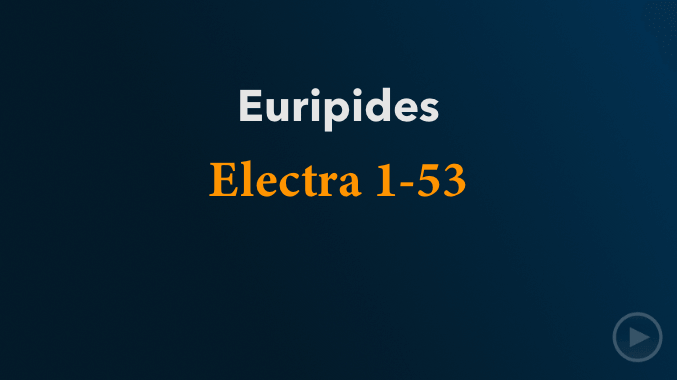• Electra 1-53 •
• Euripides •
This raw recording is meant to be used for studying purposes only, mainly of the phonemes and metre.
You can follow the original text below while listening to the mp3, or watch the video. An English translation follows:
Peasant :
"O ancient plain of land, the streams of Inachus, from which king Agamemnon once mounted war on a thousand ships and sailed to the land of Troy. After he had slain Priam, the ruler of Ilium, [5] and captured the famous city of Dardanus, he came here to Argos and set up on the high temples many spoils of the barbarians.
And in Troy he was successful; but at home he died by the guile of his wife Clytemnestra [10] and the hand of Aegisthus, son of Thyestes. And he left behind the ancient scepter of Tantalus, and is dead; but Aegisthus rules the land, possessing Agamemnon's wife, the daughter of Tyndareus.
Now as for those whom he left in his house when he sailed to Troy, [15] his son Orestes and his young daughter Electra: when Orestes was about to die at the hand of Aegisthus, his father's old servant stole him away and gave him to Strophius to bring up in the land of the Phocians. Electra stayed in her father's house, [20] and when she came to the blooming season of youth, the foremost suitors of the land of Hellas asked for her in marriage.
But Aegisthus feared she might bear to some chieftain a son who would avenge Agamemnon, and so he kept her at home and did not betroth her to any bridegroom.
[25] When even this filled him with great fear, that she might secretly bear children to some noble lord, Aegisthus planned to kill her, but her mother, although cruel at heart, rescued her from his hand. For she had a pretext for having slain her husband, [30] but she feared that she would be despised for the murder of her children.
So then, for these reasons, Aegisthus devised such a scheme: he promised gold to anyone who should kill Agamemnon's son, who had left the country as an exile, while Electra he gave [35] in marriage to me. My ancestors were Mycenaeans; in that respect at least I am not to blame. My family was noble in race but poor in money—which is the ruin of good birth.
He gave her to a powerless man so that his fear might lose its power. [40] For if some man of high position got her, he would have roused the sleeping blood of Agamemnon and judgment would have come at some time to Aegisthus.
But I have never —Cypris knows this too— dishonored her in bed; she is still a virgin indeed. [45] I am ashamed to have the daughter of a wealthy man and violate her, when I was not born of equal rank. And I groan for the wretched Orestes, called my kinsman, if he shall ever return to Argos and see the unfortunate marriage of his sister.
Αὐτουργός :
ὦ γῆς παλαιὸν ἄργος, Ἰνάχου ῥοαί,
ὅθεν ποτ᾽ ἄρας ναυσὶ χιλίαις Ἄρη
ἐς γῆν ἔπλευσε Τρῳάδ᾽ Ἀγαμέμνων ἄναξ.
κτείνας δὲ τὸν κρατοῦντ᾽ ἐν Ἰλιάδι χθονὶ
Πρίαμον, ἑλών τε Δαρδάνου κλεινὴν πόλιν, 5
ἀφίκετ᾽ ἐς τόδ᾽ Ἄργος, ὑψηλῶν δ᾽ ἐπὶ
ναῶν ἔθηκε σκῦλα πλεῖστα βαρβάρων.
κἀκεῖ μὲν εὐτύχησεν: ἐν δὲ δώμασι
θνῄσκει γυναικὸς πρὸς Κλυταιμήστρας δόλῳ
καὶ τοῦ Θυέστου παιδὸς Αἰγίσθου χερί. 10
χὣ μὲν παλαιὰ σκῆπτρα Ταντάλου λιπὼν
ὄλωλεν, Αἴγισθος δὲ βασιλεύει χθονός,
ἄλοχον ἐκείνου Τυνδαρίδα κόρην ἔχων.
οὓς δ᾽ ἐν δόμοισιν ἔλιφ᾽ ὅτ᾽ ἐς Τροίαν ἔπλει,
ἄρσενά τ᾽ Ὀρέστην θῆλύ τ᾽ Ἠλέκτρας θάλος, 15
τὸν μὲν πατρὸς γεραιὸς ἐκκλέπτει τροφεὺς
μέλλοντ᾽ Ὀρέστην χερὸς ὑπ᾽ Αἰγίσθου θανεῖν
Στροφίῳ τ᾽ ἔδωκε Φωκέων ἐς γῆν τρέφειν:
ἣ δ᾽ ἐν δόμοις ἔμεινεν Ἠλέκτρα πατρός,
ταύτην ἐπειδὴ θαλερὸς εἶχ᾽ ἥβης χρόνος, 20
μνηστῆρες ᾔτουν Ἑλλάδος πρῶτοι χθονός.
δείσας δὲ μή τῳ παῖδ᾽ ἀριστέων τέκοι
Ἀγαμέμνονος ποινάτορ᾽, εἶχεν ἐν δόμοις
Αἴγισθος οὐδ᾽ ἥρμοζε νυμφίῳ τινί.
ἐπεὶ δὲ καὶ τοῦτ᾽ ἦν φόβου πολλοῦ πλέων, 25
μή τῳ λαθραίως τέκνα γενναίῳ τέκοι,
κτανεῖν σφε βουλεύσαντος, ὠμόφρων ὅμως
μήτηρ νιν ἐξέσῳσεν Αἰγίσθου χερός.
ἐς μὲν γὰρ ἄνδρα σκῆψιν εἶχ᾽ ὀλωλότα,
παίδων δ᾽ ἔδεισε μὴ φθονηθείη φόνῳ. 30
ἐκ τῶνδε δὴ τοιόνδ᾽ ἐμηχανήσατο
Αἴγισθος: ὃς μὲν γῆς ἀπηλλάχθη φυγὰς
Ἀγαμέμνονος παῖς, χρυσὸν εἶφ᾽ ὃς ἂν κτάνῃ,
ἡμῖν δὲ δὴ δίδωσιν Ἠλέκτραν ἔχειν
δάμαρτα, πατέρων μὲν Μυκηναίων ἄπο 35
γεγῶσιν — οὐ δὴ τοῦτό γ᾽ ἐξελέγχομαι:
λαμπροὶ γὰρ ἐς γένος γε, χρημάτων δὲ δὴ
πένητες, ἔνθεν ηὑγένει᾽ ἀπόλλυται —
ὡς ἀσθενεῖ δοὺς ἀσθενῆ λάβοι φόβον.
εἰ γάρ νιν ἔσχεν ἀξίωμ᾽ ἔχων ἀνήρ, 40
εὕδοντ᾽ ἂν ἐξήγειρε τὸν Ἀγαμέμνονος
φόνον δίκη τ᾽ ἂν ἦλθεν Αἰγίσθῳ τότε.
ἣν οὔποθ᾽ ἁνὴρ ὅδε — σύνοιδέ μοι Κύπρις —
ᾔσχυνεν εὐνῇ: παρθένος δ᾽ ἔτ᾽ ἐστὶ δή.
αἰσχύνομαι γὰρ ὀλβίων ἀνδρῶν τέκνα 45
λαβὼν ὑβρίζειν, οὐ κατάξιος γεγώς.
στένω δὲ τὸν λόγοισι κηδεύοντ᾽ ἐμοὶ
ἄθλιον Ὀρέστην, εἴ ποτ᾽ εἰς Ἄργος μολὼν
γάμους ἀδελφῆς δυστυχεῖς ἐσόψεται.
ὅστις δέ μ᾽ εἶναί φησι μῶρον, εἰ λαβὼν 50
νέαν ἐς οἴκους παρθένον μὴ θιγγάνω,
γνώμης πονηροῖς κανόσιν ἀναμετρούμενος
τὸ σῶφρον ἴστω καὐτὸς αὖ τοιοῦτος ὤν.
On Youtube :

